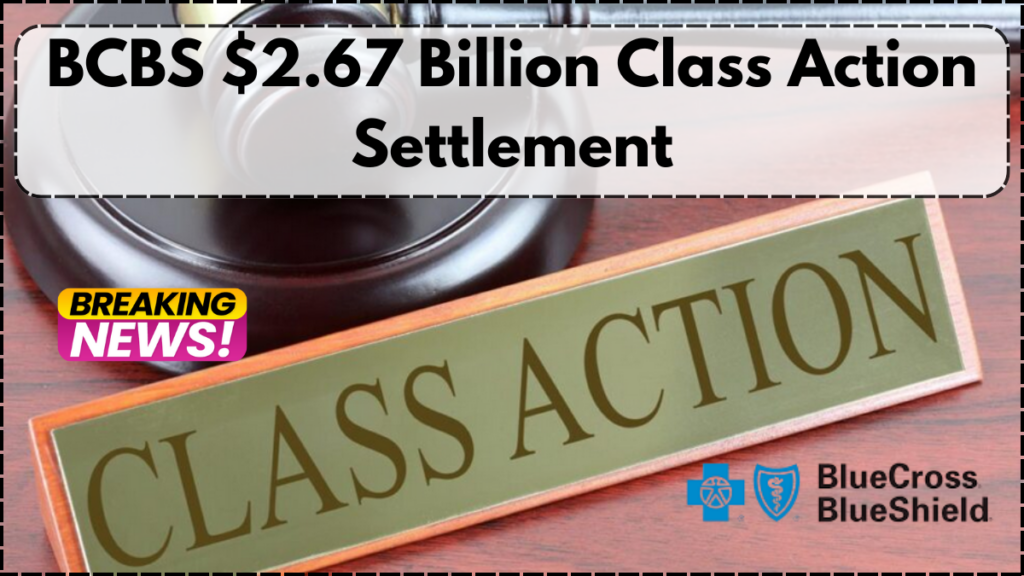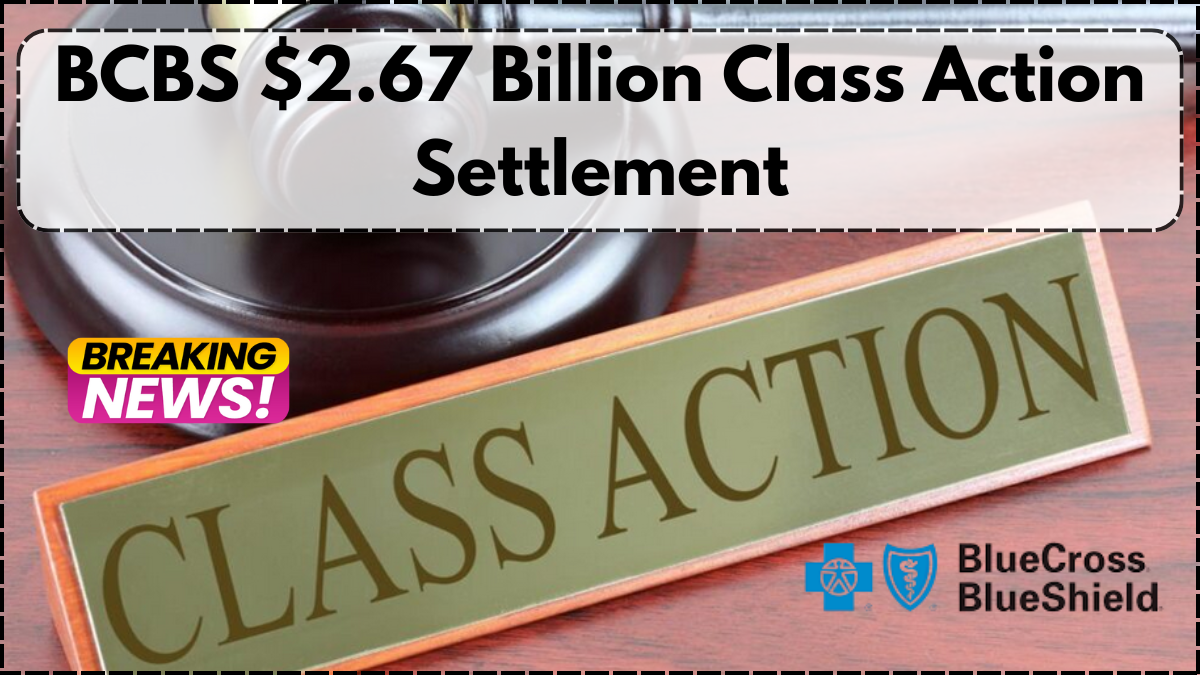If you or your business paid for a Blue Cross Blue Shield (BCBS) health insurance plan within the past two decades, you could be entitled to compensation from a $2.67 billion antitrust class action settlement. This case, one of the largest in U.S. healthcare history, stems from a lawsuit accusing BCBS companies of violating federal competition laws.
Let’s walk through everything you need to know—eligibility, how to file a claim, and what payout you might receive.

What Triggered the Blue Cross Blue Shield Lawsuit?
The lawsuit, filed years ago and settled in 2020, accused the Blue Cross Blue Shield Association and its independent affiliates of engaging in anti-competitive behavior. The primary allegations included:
-
Dividing geographic territories to avoid competition between companies
-
Suppressing market competition, which led to inflated premiums
-
Violating antitrust laws, particularly the Sherman Act
These practices allegedly limited choices and drove up healthcare costs for both individual policyholders and businesses. Even though BCBS denied any wrongdoing, they agreed to settle the case to avoid prolonged litigation.
Settlement Breakdown: Who Gets What?
The $2.67 billion settlement has been split into two major parts:
| Category | Amount Allocated |
|---|---|
| Compensation for Class Members | Approximately $1.9 billion |
| Legal and Administrative Costs | Around $770 million |
Your potential payout depends on a few variables:
-
Duration of coverage with BCBS
-
Type of insurance plan (fully insured vs. self-funded)
-
Total number of claims submitted
Those with fully insured plans—where BCBS assumed financial risk—are expected to receive larger payments than those with self-funded plans.
Who Qualifies for the Settlement?
Eligibility is based on two major policyholder categories:
Fully Insured Class Members
These individuals or businesses bought a policy from BCBS where the insurer covered the financial risk.
Eligibility: Paid BCBS premiums between February 7, 2008, and October 2024
Self-Funded Accounts
Larger employers that paid healthcare costs out-of-pocket and only used BCBS for administrative services.
Eligibility: Used BCBS between September 1, 2015, and October 16, 2020
You do not need to still be insured by BCBS to qualify—you simply had to meet the criteria during the eligible years.
How to File Your Claim in 2025
There are two ways to file your claim:
Online Submission
Visit the official settlement site: 👉 www.bcbssettlement.com
You’ll be asked to:
-
Enter your name and contact info
-
Choose between an individual or business filing
-
Provide policy details and relevant timeframes
-
(Optional) Upload supporting documentation
By Mail
You can request a physical form from the claims administrator and submit it via postal mail.
Key Dates and Deadlines
The original claim deadline (November 5, 2021) has now been extended to July 29, 2025. If you haven’t filed yet, you still have time.
Payment Timeline: Disbursements will begin after all legal appeals are resolved. As of April 2025, payments are still pending but updates are posted on the official site.
What Kind of Payout Can You Expect?
There’s no fixed amount per person. Instead, the distribution will depend on:
-
Your plan type (fully insured vs. self-funded)
-
Length of time insured
-
Total number of valid claims
Here’s a rough guide:
-
An individual covered for 5 years may receive several hundred dollars
-
A small business with multi-employee plans over several years could receive thousands
Final payment amounts will vary once all claims are processed.
Participating Blue Cross Blue Shield Companies
The settlement includes more than 30 regional and national BCBS organizations, including:
-
Blue Cross Blue Shield of Alabama
-
Anthem BCBS
-
Highmark BCBS
-
BCBS of Texas
-
CareFirst BCBS
-
Horizon BCBS of New Jersey
-
Regence BlueShield
-
Empire BCBS
-
Blue Cross Blue Shield of Florida
-
and many more across the U.S.
Is This a Legitimate Settlement?
Yes. The settlement was approved by the U.S. District Court for the Northern District of Alabama. An independent administrator is overseeing the claim process, and no upfront payment or sensitive data is required to file.
⚠️ Important: Avoid scam emails or phone calls asking for fees or personal details. Only use the official site: 👉 www.bcbssettlement.com
Why This Settlement Matters in 2025
This class action shines a light on how lack of competition can hurt consumers. For years, many Americans may have unknowingly overpaid for health insurance due to the alleged BCBS practices.
Now, this case sets a precedent—companies must answer for actions that affect nationwide healthcare affordability.
Conclusion
If you were a BCBS policyholder between 2008 and 2024, this could be your chance to recover funds lost due to anti-competitive practices. Whether you’re an individual or a business, it’s worth checking your eligibility. With the new deadline extended to July 29, 2025, there’s still time to claim your share of the $2.67 billion settlement.
Visit the official site, gather your documentation, and file your claim. Don’t leave money on the table.
FAQs
What if I no longer have my insurance documents?
You can still file a claim. While documentation helps, it’s not always required. Just provide as much detail as possible about your coverage period and type.
Can former employees file if their employer provided BCBS coverage?
No, only the employer or entity that paid the premiums can file on behalf of a self-funded or fully insured group.
When will payments be issued?
Payments are expected after the court resolves all appeals. As of April 2025, that process is ongoing. Updates are posted regularly on the official site.
Is the claim process free?
Yes. Filing a claim is completely free, and you should never be asked to pay upfront or provide sensitive banking information.
Can I file both as an individual and on behalf of a business?
Yes, if you qualify in both roles. You’ll need to submit separate claims with the appropriate details for each.
For More Information Click Here
Pari is a passionate writer known for captivating stories that blend imagination and reality. Inspired by travel, history, and everyday moments, Pari crafts narratives that resonate deeply with readers.




